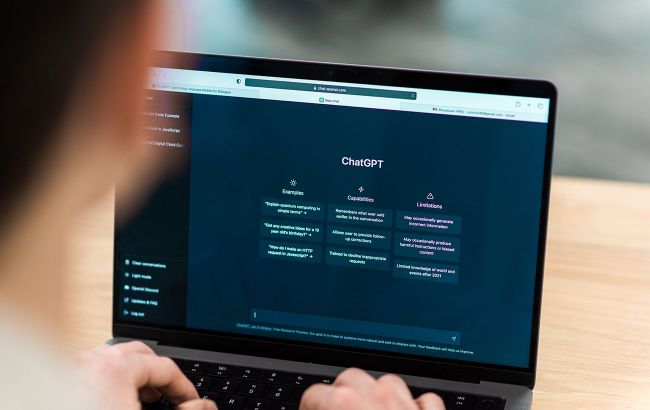5 things you should never share with AI chatbots
 5 things not to disclose to an AI chatbot (photo: Freepik)
5 things not to disclose to an AI chatbot (photo: Freepik)
In today’s world, communication with AI systems, such as ChatGPT, has become an integral part of daily life. We use chatbots to search for information, solve problems, and even discuss personal matters. However, despite the convenience, it is important to remember that not all information is safe to share with these systems, reports MakeUseOf.
Privacy risks of AI chatbots
Chatbots like ChatGPT and Google Gemini have gained popularity for their ability to generate human-like responses. However, their operation based on large language models (LLMs) presents privacy and security risks. These vulnerabilities highlight that personal information shared during interactions may be exposed or misused.
Data collection
Chatbots use extensive training data, which may include user interactions. Companies like OpenAI offer the option to opt out of data collection, but ensuring full confidentiality is challenging.
Server vulnerabilities
Storing user data makes it a target for hackers, which could lead to theft and misuse of personal information.
Third-party access
Data from interactions with chatbots may be shared with third-party service providers or accessible by company employees, increasing the risk of leaks.
Generative AI
Critics fear that the growing use of such technologies could heighten security and privacy risks.
Understanding these risks is important to protecting your data when using ChatGPT and other chatbots. Companies like OpenAI offer some transparency and control, but the complexity of data exchange and vulnerabilities demands heightened vigilance.
To ensure your privacy and security, there are five key types of data you should never share with a generative AI chatbot.
Financial information
With the widespread use of AI-based chatbots, many users turn to them for financial advice and personal budgeting. While such tools can improve financial literacy, it’s important to be aware of the risks associated with sharing this data with chatbots.
Using chatbots as financial advisors exposes you to the risk of disclosing sensitive financial information. Hackers could use it to access your accounts.
Despite claims of data anonymity, it may still be accessible to third-party organizations or employees. For instance, a chatbot might analyze your spending habits to provide recommendations. If this data falls into the wrong hands, you could be targeted by phishing emails impersonating your bank.
Limit interactions with AI chatbots to general inquiries and facts to protect your financial information.
Personal and confidential thoughts
Some users treat AI as a virtual therapist, not realizing the potential impact on their mental health.
Chatbots lack real expertise and provide only general responses to mental health-related queries. This could lead to inappropriate advice regarding medications or treatment methods, potentially causing harm.
Moreover, disclosing personal thoughts carries significant privacy risks. Secrets and private thoughts may be published online or used as data for training AI systems. Malicious actors could exploit this information for blackmail or sell it on the dark web.
AI chatbots are suitable for general information and support but cannot replace professional therapy. If you need help with mental health, seek a qualified specialist who can provide personalized assistance while maintaining confidentiality.
Confidential workplace information
A key mistake when using AI chatbots is sharing confidential work-related information. Major tech companies like Apple, Samsung, and Google have restricted the use of such tools by their employees in the workplace.
For example, a Bloomberg report described a case where Samsung employees used ChatGPT for programming, inadvertently uploading sensitive code to the platform. This led to a company data leak and a subsequent ban on AI chatbots in the workplace.
If you use these tools to solve coding problems or perform other work-related tasks, you should remember the risk of data leakage.
Employees often use chatbots to automate tasks or create brief reports, which could lead to accidental data disclosure. To protect confidential information, avoid sharing workplace data with neural networks. This will reduce the risk of leaks and cyberattacks.
Passwords
Sharing passwords online, especially with AI chatbots, is strictly prohibited. These platforms store data on servers, increasing the risk of compromising confidential information.
A major data breach involving ChatGPT occurred in May 2022, raising concerns about platform security. Furthermore, in Italy, the use of ChatGPT was temporarily banned due to non-compliance with GDPR (EU General Data Protection Regulation). This incident underscored the vulnerability even of advanced AI systems.
To protect your account information, never share passwords with chatbots, even if they request them for troubleshooting purposes. Use specialized password managers or secure IT protocols provided by your organization.
Personal information and location
Just like on social media platforms, you should avoid sharing personally identifiable information (PII) when using AI chatbots. This includes home addresses, social security numbers, birthdates, and health information — anything that could be used to identify or locate you.
For example, sharing your home address when asking a chatbot for nearby services could unintentionally expose you to risks. If this information is intercepted or leaked, it could be used for identity theft or tracking you in real life.
Furthermore, excessive disclosure of information on integrated AI platforms like Snapchat could accidentally reveal more about you than intended.
How to protect your privacy when using AI chatbots:
- Familiarize yourself with chatbot privacy policies to understand potential risks;
- Avoid asking questions that could inadvertently disclose your personal information;
- Do not share medical data with AI chatbots;
- Be cautious when using AI on social platforms like Snapchat.
AI chatbots are useful in solving many tasks, but they also pose serious privacy threats. Protecting your data while interacting with bots like ChatGPT, Copilot, or Claude doesn’t require complex actions.
Before sharing any information, consider what might happen if that data becomes publicly available. This will help you determine what can be safely shared and what should remain private.
We also have an article on what ChatGPT Search is and what is known about the competitor to Google.

